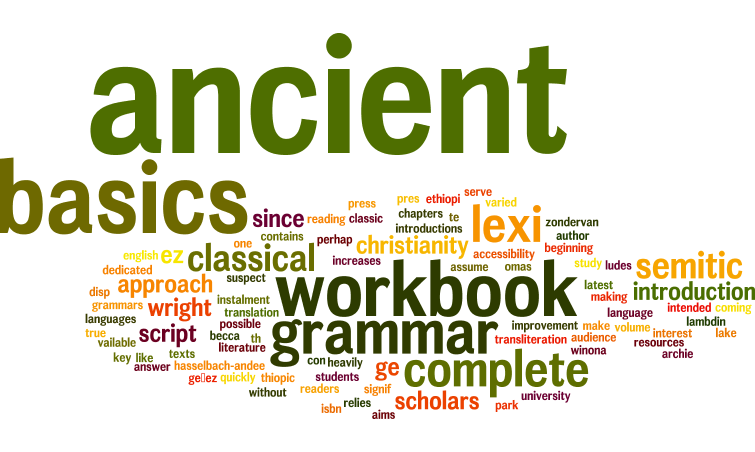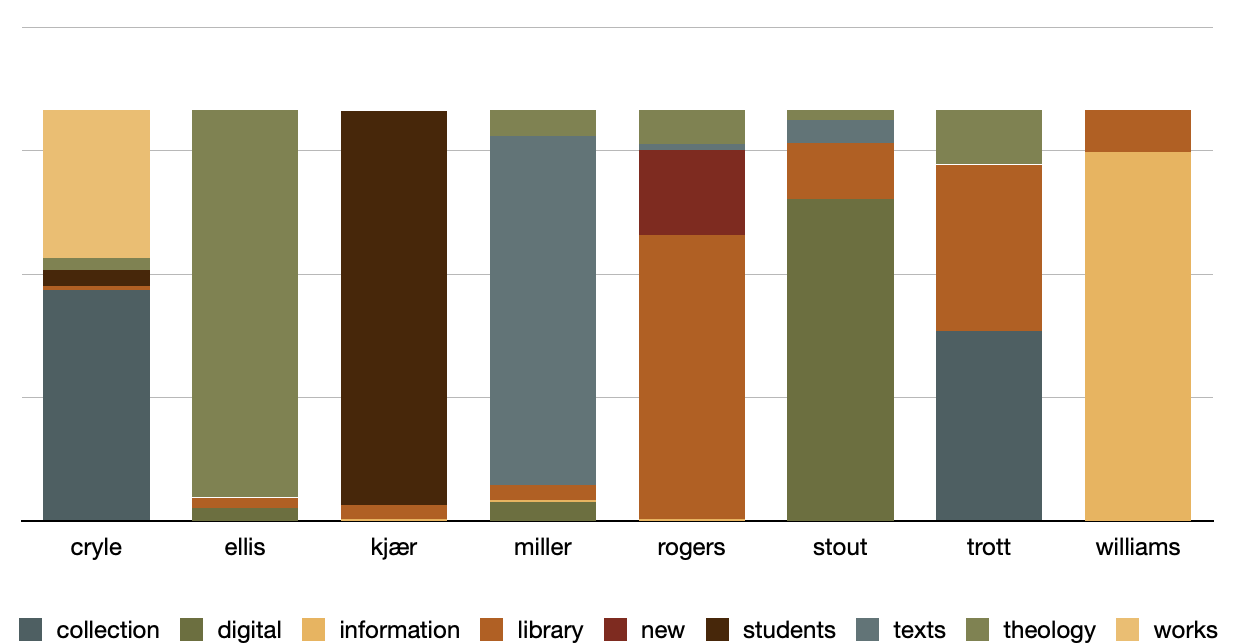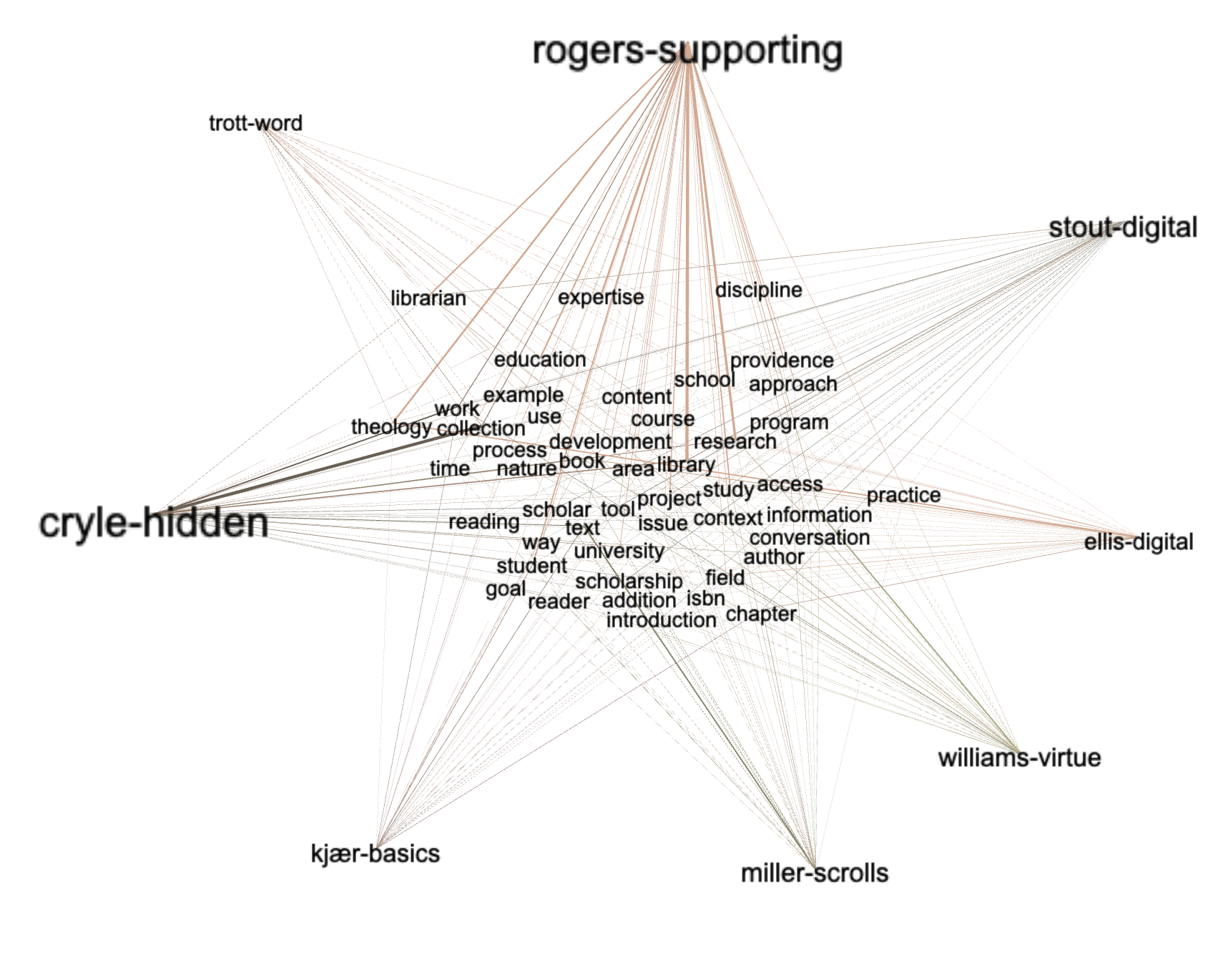
In an effort to see how quickly I can do analysis, against the entire issue of a given journal, I did some reading against Theological Librarianship (Volume 16, Number 1), and in the end, I am going away with more questions than answers, but I did learn about "ethiopic".
When it comes to size and scope, there are nine items in the issue for a total size of about 20,000 words, which, in my world, is small. One item is an editorial, there are a few reviews, and the balance are articles. See the automatically generated bibliography and index page for more detail. † Being a librarian, I am always interested in aboutness. "What are these things about?" The computed keywords allude to answers, and in this case I might say the issue is about "library", "theology", "church", and "collection". Not too surprising, but the word "ethiopic" intrigued me.

As a man named Firth once said, "You shall know a word by the company it keeps", and consequently I created a set of simple word clouds illustrating the other nearby words used when a given keyword was mentioned. The results are below. The associations may not be what you expect, and I'm getting a better idea regarding the context of "ethiopic":
 library |
 theology |
 collection |
 church |
 ethiopic |
Topic modeling is a good way to denote aboutness, and since there are nine items in the issue, I tried to divide the whole into nine themes. Here are the results in both tabular and pie chart forms:
labels weights features
library 0.27101 library research theological theology expertis...
theology 0.24435 theology digital field book science research s...
information 0.10840 information literacy intellectual bivens-tatum...
texts 0.09228 texts sacred materiality digital textual media...
digital 0.08652 digital humanities libraries tools scholarship...
students 0.07385 students ethiopic workbook texts ancient lexic...
collection 0.05828 collection church library collections theologi...
new 0.03053 new files opportunity found college autoethnog...
works 0.02591 works materials community sermons contains joh...

For a good time, I pivoted the underlying model on author names to ultimately visualized who discussed what topic. More less (mostly more), each author discusses something distinct:

Similarly, we can identify the words, in this case nouns and proper nouns, shared between each author. Thus, below is an illustration of the words that occur in at least five of the nine documents, and the words seem to surround a theme of academia:

The word "ethiopic" appeared as a computed keyword, and it also appeared in the theme labeled "students". The "students" theme is most closely associated with the author named "Kjær". Moreover, a keyword search for the word "ethiopic" returns only a single hit, "Basics of Ancient Ethiopic" by Wright and reviewed by Kjær. Upon close(er) reading of the review, "ethiopic" refers to a particular type of written script, and the:
Basics of Ancient Ethiopic contains 38 chapters, beginning with the alphabet, working its way through nouns and verb-forms, and concluding with the syntax. Each chapter ends with lexi- con words to remember and exercises highlighting the grammar component tackled in the chapter as well as lexicon words in context. At the end of the book is the full lexicon, black and white images of Ge’ez manuscripts, an example of an advanced reading exercise, and a bibliography... Wright aims to shift students from reading texts in transliteration to reading texts in Ethiopic script as quickly as possible.
I learned a two things, listed in no priority order: 1) it takes me longer to write up my analysis than to do the analysis itself, and 2) ethiopic is a type of script. Maybe you learned a few things too? Maybe I put into practice one of the Ranganathan's Laws, namely, "Save the time of the reader", and maybe you learned whether or not you want to know more about this issue of Theological Librarianship.
End of story.
† I really ought to modify the automatically generated bibliographies in order to link to the bibliographic items themselves. Such would significantly increase usability. Hmmm...
This data set -- study carrel -- ought to be available for downloading at http://carrels.distantreader.org/curated-theological_librarianship_v16_n01-2023/index.zip.
Eric Lease Morgan <emorgan@nd.edu>
Navari Family Center for Digital Scholarship
University of Notre Dame
Date created: April 27, 2023
Date updated: June 2, 2024